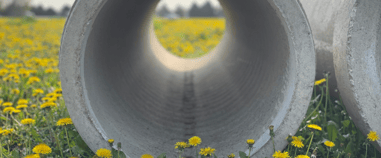RESILIENCE
Concrete Pipe: Proven Resilience.

Concrete pipe’s engineered strength, inherent durability, and long history of enduring disasters give it its proven resilience. For thousands of years, societies have relied on the durability and trustworthiness of concrete, thus making concrete pipe one of the most reliable and dependable components of infrastructure today. It endures harsh environmental conditions, including extreme weather, providing a permanent solution to infrastructure needs. As a non-combustible material, it guarantees performance during wildfires and in other fire-prone areas, ensuring safe evacuation for families and communities while also supporting rapid recovery efforts. The material's inherent density makes it resistant to flotation, providing stability and performance during heavy rainfalls and floods. It is also ideal in earthquake-prone regions due to its ability to absorb shocks and sustain minimal damage from impacts. With many concrete pipe producers local to the communities they serve, concrete pipes are readily available for quick repair or replacement, enhancing the product’s value as a key component to long-term resilient infrastructure.
Durable is defined in Webster’s dictionary as, “able to exist for a long time without significant deterioration.” With concrete pipe, durability deals with the life expectancy and enduring characteristics of its materials. There are a variety of products that can meet your specs today, but will they continue to do the job they were intended to do for the long term? The capability of pipe to perform as expected for the design life of a project is a fundamental engineering consideration, especially in today’s economic environment, where requirements have been set in place to ensure a sustainable buried infrastructure.
The Army Corp of Engineers recommends a design life of 70-100 years for precast concrete pipe, and there are countless examples of installations that surpass those numbers. This means the expectation for precast concrete’s functional life is at least twice as long as lesser materials. The reasons for this go far beyond concrete’s innate strength. Concrete also won’t burn, rust, tear, buckle, deflect, and it’s immune to the attack of most elements, whether the pipe is buried or exposed.
Quality concrete pipe densities typically range from 145-155 pounds per cubic foot. Usually the higher the density, the greater the durability of the concrete pipe.
Strength
Concrete pipe has both natural and engineered strength giving it the ability to resist service loads often well beyond its designed life.
Reliable
Made from natural resources and used for thousands of years, concrete is the most dependable and trusted infrastructure materials.
Durable
Concrete readily withstands harsh environmental conditions, including extreme temperatures, without rapid deterioration, making it resistant to damage caused by weathering or natural disasters.
Rigidity
The individual sections of concrete pipe are rigid by nature significantly reducing the risk of deformation, flexing, and failure of the pipe or system.
Fire Resistant
As a non-combustible material, concrete pipe will not burn making it the safest and preferred product in areas prone to wildfires or other fire risks.
Flotation Resistant
With the robustness and denseness of its material components, concrete pipes are highly resistant to flotation, keeping them in the ground during rainfall and catastrophic flooding situations.
Impact Resistant
Concrete pipes have the ability to absorb significant shocks and impacts while sustaining little-to-no damage, making it ideal in areas prone to earthquakes or ground movements.
Availability
With concrete pipe producers being local to their communities, products are often available quickly and within a short distance.


